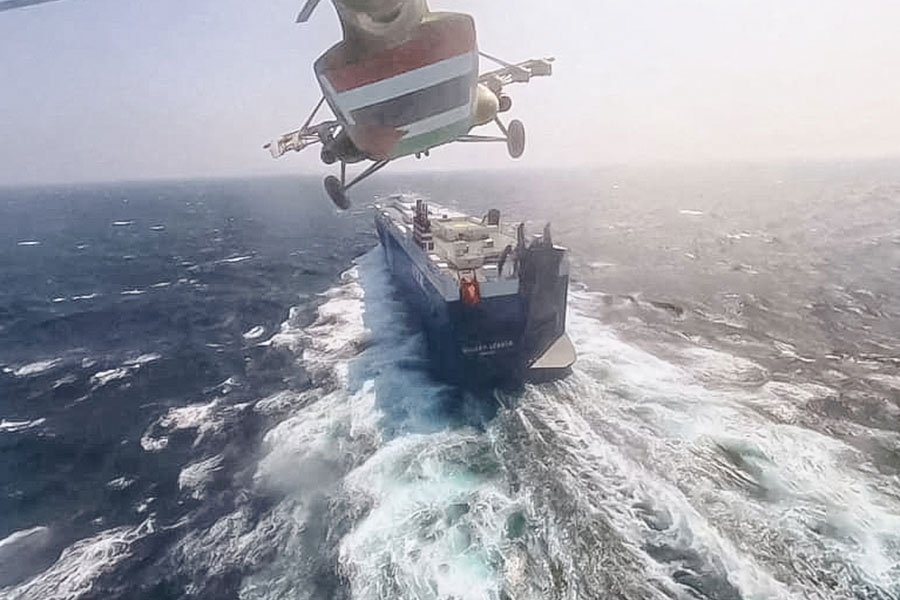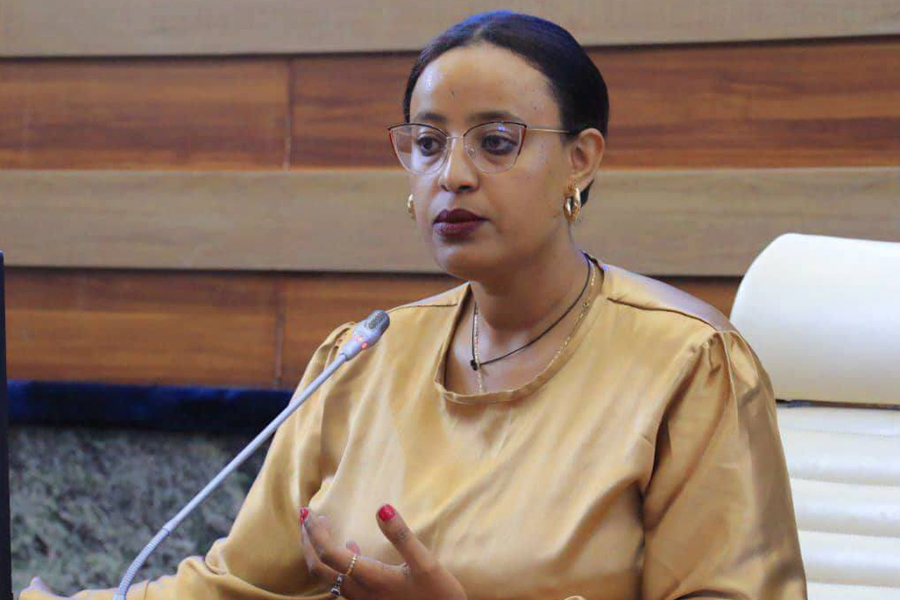
Fortune News | Dec 23,2023
Apr 6 , 2024
By Hintsa Andebrhan
In a world increasingly defined by convoluted geopolitical dynamics, the echoes of Russia's invasion of Ukraine reverberate far beyond its immediate borders, stirring a cauldron of strategic recalibrations and diplomatic manoeuvrings.
At the heart of Moscow's justification is a claim steeped in national security concerns, primarily spurred by the expansionist tendencies of Western military alliances and policies perceived to be led by the United States (US). The Kremlin's diplomatic outreach has been robust. It aims to frame the invasion as a pragmatic defence of Russian sovereignty against the backdrop of NATO's presence near its borders.
Despite widespread condemnation, Russia has engaged in a sophisticated diplomatic campaign to articulate its position, leveraging historical grievances and security imperatives to court international understanding, if not outright support. Russia's diplomatic narrative emphasises the existential threats posed by NATO's eastward expansion, portraying its military actions as a last resort in safeguarding national security. While contentious, the Kremlin's position on Ukraine reflects a deep-seated apprehension about Western encroachments.
Parallel to its military exertions, Russia has embarked on a strategic economic offensive. In response to Western sanctions, Moscow has sought to de-dollarise its trade, aligning with countries like China, India, Brazil, and Saudi Arabia in a concerted effort to challenge the Dollar's hegemony in global commerce. This economic shift, part of a broader Russian strategy to counterbalance Western influence, signals a significant realignment in international trade dynamics, with potential long-term implications for global economic stability.
However, the unfolding saga is not confined to the European theatre. Its repercussions are felt in distant regions, notably the Horn of Africa, where Ethiopia finds itself at a geopolitical crossroads of shifting alliances and emerging challenges in international relations.
The Middle East, too, has witnessed a recalibration of Russian foreign policy, particularly in relation to the Israeli-Palestinian conflict. Once viewing Israel as a crucial ally, the Kremlin has shifted its perspective, advocating for a Palestinian state within the 1967 borders, with East Jerusalem as its capital. The policy shift, contrasting with prior Russian positions, shows Moscow's intent to challenge Western geopolitical interests in the region aggressively.
Another arena of Russian assertiveness is the Red Sea corridor, where Moscow has deployed warships in a purported mission against piracy. While presented as an effort to secure maritime routes, this move can broadly be interpreted as an attempt to bolster Russian influence in a strategically vital region, directly challenging Western and, particularly, United States interests.
Ethiopia appears to be in a precarious position amid these global chess moves. A landlocked and aspiring for maritime access, its leaders are caught in the whirlwind of shifting alliances and regional tensions. The United Nations Convention on the Law of the Sea (UNCLOS) provides a legal framework for landlocked countries to access the sea, yet realising such rights hinge on cooperative relations with coastal states.
Ethiopia's ambitions for a maritime corridor, apparently essential for its economic development and regional integration, face obstacles not only in logistics and legalities but also in international diplomacy. The geopolitical upheaval, illustrated by the Russian invasion of Ukraine and its global repercussions, adds layers of complexity to Ethiopia's quest. Relations with neighbouring countries, each with its own strategic interests and alliances, are crucial.
Ethiopia's foreign policy, particularly towards Somalia and Sudan, demands a nuanced approach that balances national ambitions with regional dynamics and the overarching shifts in global power structures. Reports of Ethiopia's potential territorial aspirations, as expressed by Kenyan politicians about regions like Marsabit and Lamu, add another dimension to the diplomatic challenges faced by Prime Minister Abiy Ahmed's (PhD) administration. Whether established or not, such assertions underline the sensitivities involved in regional relations and the importance of maintaining a diplomacy-first approach to addressing border and access issues.
The recommendation for Ethiopia to reassess its foreign policy, especially about the Red Sea and its coastal neighbours, is timely. A strategic reorientation towards building stronger alliances and a realistic appraisal of geopolitical shifts could enhance its position in a rapidly changing world. The country's engagement with Somaliland and the broader Somali political landscape, alongside its position on the Sudanese border dispute, should say a lot about pursuing national interests and contributing to regional stability.
The interconnectedness of global events has never been more apparent. The fallout from Russia's invasion of Ukraine extends beyond the immediate conflict zone, influencing international relations, economic strategies, and regional geopolitics. The challenges are manifold for countries like Ethiopia, situated in strategically important but volatile regions. Navigating these challenges requires a balanced approach considering the evolving global landscape, regional dynamics, and national interests.
PUBLISHED ON
Apr 06,2024 [ VOL
25 , NO
1249]


Fortune News | Dec 23,2023

Fortune News | May 17,2025

Editorial | Feb 18,2023

My Opinion | Aug 26,2023

My Opinion | Sep 23,2023

Editorial | Aug 26,2023

Radar |

Commentaries | Jan 13,2024

My Opinion | Feb 24,2024

My Opinion | Dec 16,2023

Photo Gallery | 175075 Views | May 06,2019

Photo Gallery | 165301 Views | Apr 26,2019

Photo Gallery | 155588 Views | Oct 06,2021

My Opinion | 136771 Views | Aug 14,2021

Dec 22 , 2024 . By TIZITA SHEWAFERAW
Charged with transforming colossal state-owned enterprises into modern and competitiv...

Aug 18 , 2024 . By AKSAH ITALO
Although predictable Yonas Zerihun's job in the ride-hailing service is not immune to...

Jul 28 , 2024 . By TIZITA SHEWAFERAW
Unhabitual, perhaps too many, Samuel Gebreyohannes, 38, used to occasionally enjoy a couple of beers at breakfast. However, he recently swit...

Jul 13 , 2024 . By AKSAH ITALO
Investors who rely on tractors, trucks, and field vehicles for commuting, transporting commodities, and f...

Oct 18 , 2025
The political establishment, notably the ruling party and its top brass, has become p...

Oct 11 , 2025
Ladislas Farago, a roving Associated Press (AP) correspondent, arrived in Ethiopia in...

Oct 4 , 2025
Eyob Tekalegn (PhD) had been in the Governor's chair for only weeks when, on Septembe...

Sep 27 , 2025
Four years into an experiment with “shock therapy” in education, the national moo...

Oct 18 , 2025 . By NAHOM AYELE
In a sweeping reform that upends nearly a decade of uniform health insurance contribu...

Oct 18 , 2025 . By BEZAWIT HULUAGER
A bill that could transform the nutritional state sits in a limbo, even as the countr...

Oct 18 , 2025 . By SURAFEL MULUGETA
A long-planned directive to curb carbon emissions from fossil-fuel-powered vehicles h...

Oct 18 , 2025 . By BEZAWIT HULUAGER
Transaction advisors working with companies that hold over a quarter of a billion Bir...